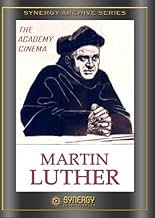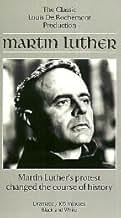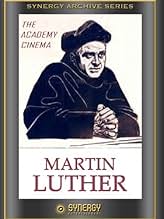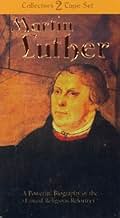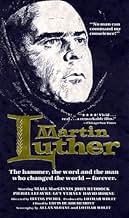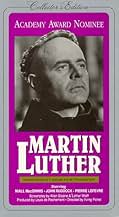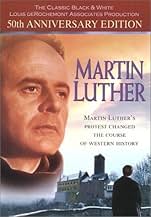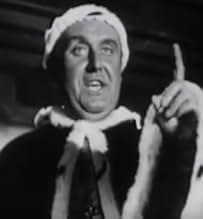Ajouter une intrigue dans votre langueBiopic of German priest Martin Luther (Niall MacGinnis), covering his life between 1505 and 1530 A.D., and the birth of the Protestant Reformation movement.Biopic of German priest Martin Luther (Niall MacGinnis), covering his life between 1505 and 1530 A.D., and the birth of the Protestant Reformation movement.Biopic of German priest Martin Luther (Niall MacGinnis), covering his life between 1505 and 1530 A.D., and the birth of the Protestant Reformation movement.
- Nommé pour 2 oscars
- 1 victoire et 4 nominations au total
- Carlstadt
- (as Allastair Hunter)
- Katherine von Bora
- (as Annette Carrell)
Avis en vedette
He was not a flawless figure. He was self-centered, and resented rival "heretics" (Zwingly, John of Munster, Calvin), and he would become really vicious towards the Jews for failing to follow his leadership into "true Christianity". In fact his diatribes against the Jews would become the true foundation of modern German anti-Semitism. But he remains the founder of Protestantism.
His flaws do not appear in this film, which was made by the Lutheran Church.
However the film is a pretty faithful account of his conflict with the organized Church, and how it led to the creation of Protestantism (and, in particular, Lutheranism). It gave Niall MacGinnis the best straight dramatic lead role in his career (the closest second is his Karswell, the villain in NIGHT OF THE DEMON). MacGinnis always was a superior supporting actor in small parts, so it is worth noting that when he was given an important part like Luther he did the part well.
Martin Luther is not THE founder of Protestantism, he's the founder of one of the Protestant denominations. There was a fellow over in Switzerland named John Calvin, a guy later on in Scotland named John Knox, and even that wife slaughtering monarch in England Henry VIII all founded various Protestant denominations.
Yet Luther, a priest who originally wanted to be a lawyer and who attacked the ruling Roman Catholic Church, certainly showed a lawyer's training. His famous 95 questions nailed to the church door in Wittemberg was nothing less than an indictment.
The great contribution theologically speaking that Luther made was the notion that no one, not even a Pope intercedes for man in his relationship with the Deity. One is saved by faith alone in the fact that Jesus is the Messiah who sacrificed himself for the sins of man.
It should not be forgotten that at this time the Catholic church was very engaged in the geopolitics of Europe and the world as a temporal power as well as a center of faith. The Pope as a temporal ruler had temporal needs like the ruler of any other state, maybe more so with his dual function. Hence the sale of indulgences which according to the Lutheran versions were dispensations for sins to come. I'm sure Catholics will differ, but they didn't produce this film.
Niall McGinniss makes a fine and upstanding Martin Luther. The film was shot on location in West Germany in the places mentioned in the story. The film also got Oscar nominations for Art&Set Design and black and white cinematography in its very graphic depiction of medieval Germany.
It's not my view of Martin Luther, but it certainly is the view that Lutherans certainly have of him.
The acting in the movie is excellent, as are the scenery and costumes, shown in stark black and white photography. The producers spared no expense to present the wide range of political and religious figures with whom Luther interacted. The dialogs are poignant and always clearly understandable over any background music. Unfortunately, my CD exhibits a rather poor video quality, considering that it is based on a post-WW2 b/w movie. Still, the film is fascinating to watch from beginning to end and, if shown in high school, would successfully replace a week of dry learning.
MARTIN LUTHER is a curious collaboration between three countries – the U.S., Germany (from where Martin Luther himself emanated) and the U.K.; in fact, while the director (and bit-part actor) Irving Pichel is an American, the lead here is played – superbly, I might add – by the Irish character actor Niall MacGinnis (perhaps best-known for his chilling portrayal of Karswell, the occult-practicing villain of Jacques Tourneur’s CURSE OF THE DEMON [1957]). His thoughtful performance is very effective in illustrating the various facets of Luther’s personality: his initial inner conflicts, the laying-down of (and firm conviction in) his own beliefs, as well as the strength necessary for opposing the power of the Church (facing disrepute from both his peers and his congregation, not to mention an eventual excommunication). Furthermore, we’re also shown the build-up of support to his particular credo where it attracts people from all walks of life…and even lands him a wife!
The script does quite well in delineating the essential difference between the doctrine of the Catholic Church (in its most oppressive state, back when it was still a political force to be reckoned with) and Luther’s pragmatic but no less steadfast approach to religion: the latter favors a strict adherence to Scriptures in the face of the Church’s fire-and-brimstone teachings (resorting to the deception of ignorant parishioners by proposing the worship of worthless holy relics and the offer of money in order to obtain indulgences in the afterlife, or the callous bestowing of titles upon non-clerical albeit aristocratic subjects).
When I was in Hollywood in 2005, I had caught LUTHER (1974) on TV: directed by Guy Green from a stage rendition by John Osborne and featuring Stacy Keach in the title role, it’s been released on DVD by Kino as part of “The American Film Theater Collection”. While that version, too, was undeniably interesting and effective, the earlier cinematic i.e. less stagey treatment was perhaps the more satisfactory; by the way, there’s been an even more recent biopic of the famous religious figure starring Joseph Fiennes, which is readily available from my local DVD rental outlet.
Le saviez-vous
- AnecdotesThis movie was never released in Québec, Canada. At the time, Québec's movie censorship board (made up entirely of French-speaking Catholics) refused to approve this movie to be shown in Québec's movie theaters. Therefore, it could only be shown in the basements of Québec's Protestant churches.
- Citations
Dr. Eck: Martin Luther! Do you think you are the only one who knows the truth?
Martin Luther: I will tell you what I think. I have the right to believe freely. To be a slave to no man's authority. To confess what appears to me to be true whether it is proved or disapproved, whether it is spoken by Catholic or by heritic.
Dr. Eck: Then you deny the authority of the pope!
Martin Luther: In matters of faith, I think that neither council, nor pope, nor any man has power over my conscience. And where they disagree with scripture, I deny pope and council and all. A simple layman armed with scripture is greater than the mightiest pope without it.
Dr. Eck: Heresy, Doctor Luther! Heresy!
Martin Luther: Heresy? So be it. It is still the truth!
- ConnexionsFeatured in Wormwood: Chapter 2: A Terrible Mistake (2017)
Meilleurs choix
- How long is Martin Luther?Propulsé par Alexa
Détails
- Date de sortie
- Pays d’origine
- Langue
- Aussi connu sous le nom de
- Filmen om Martin Luther
- Lieux de tournage
- sociétés de production
- Consultez plus de crédits d'entreprise sur IMDbPro
Box-office
- Budget
- 500 000 $ US (estimation)
- Durée1 heure 45 minutes
- Couleur
- Mixage
- Rapport de forme
- 1.37 : 1
Contribuer à cette page


